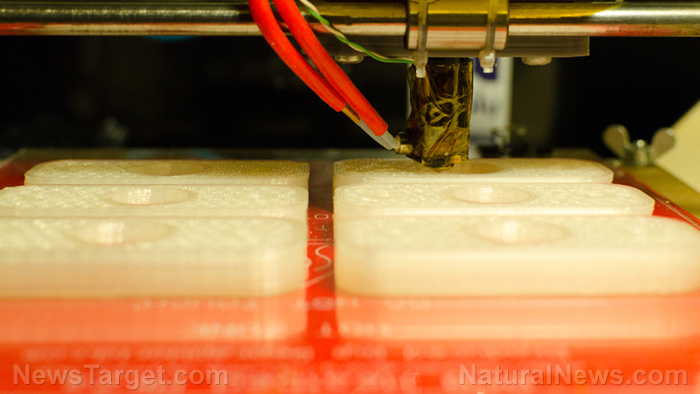Is your gut health the key to balancing your blood sugar?
05/14/2019 / By Lance D Johanson

Blood sugar levels are rising throughout the American population. According to the Centers for Disease Control, more than one third of Americans are now suffering from pre-diabetes, a metabolic condition where the pancreas fails to produce enough of a hormone called insulin. When working properly, the pancreas produces the right amount of insulin to help the cells take up sugar from the bloodstream. The main driver behind this breakdown of metabolic processes is the standard American diet (SAD), which is demolishing gut health and breaking down the normal functions of the endocrine system.
Improvements in gut microbiome lower the blood sugar level of animals
Researchers are finding out that hormonal health is influenced by the presence of bacteria in the gut microbiome. An interesting study published in the journal mSphere investigated changes in the gut microbiome of animals and learned how these changes impact pancreas function and blood sugar balance. In this study, a diabetes drug called acarbose altered the gut microbiome of animals, allowing two commensal bacteria species to flourish so the function of the pancreas could be improved. Consumption of acarbose, in conjunction with a high starch diet, improved stool samples of Bacteroidaceae and Bifidobacteriaceae, two species of beneficial bacteria. The researchers also observed the die-off of Verruocomicorbiacea and Bacteroidales S24-7 bacteria. Changes in the gut microbiome indicated improvements in the animals’ pancreas function, because as soon as the protocol was halted, the changes went away. The improvements in pancreas function were diet-dependent, indicated by improvements in the gut microbiome. This study indicates that profiling of the gut microbiome and stool samples is important for understanding how the endocrine system works. Gut health is at the center of future diabetes prevention strategies.
“We know that there seem to be certain gut bacteria compositions that are more closely linked with diabetes, and that might even precede the clinical onset of diabetes,” says study author Nicole Koropatkin, Ph.D.
High fiber, plant-based diet essential for preventing diabetes
A high fiber diet “produces a lot of short-chain fatty acids that regulate immune development and energy homeostasis,” explains Koropatkin. Foods such as flax seed, chia seed, black beans, oatmeal, lima beans, brussel sprouts, psyllium seed husk, and lentils are great options for enhancing gut health. Fermented foods such as kimchi and apple cider vinegar (with the mother) introduce commensal bacteria to the gut, building the quantity and diversity of microbes that improve digestion, detoxification, nutrient assimilation, and energy homeostasis. Pre-biotic rich foods such as asparagus, garlic, leek, onion, and artichoke provide the gut with non-digestible, heat resistant, fiber-like substances that feed the good bacteria in the gut. In essence, a plant-based diet that is rich in fiber, phyto-nutrients, and commensal bacteria provides the body with the instructions it needs to regulate digestion, blood sugar levels, and so much more.
Avoiding antibiotics and glyphosate essential for protecting gut health
This study also shows the importance of avoiding foods and medicines that destroy commensal bacteria in the gut. Antibiotics, foods that contain high levels of antibiotics, and vaccines that contain antibiotics are altering the gut’s microbiome in a way that promotes disease. Glyphosate-ridden foods introduce a registered antibiotic into the gut, damaging the microbiome and hindering the body’s ability to heal itself. The $2 billion dollar settlement that Bayer-Monsanto must pay out is a grand awakening to people around the world that glyphosate’s damage to gut health could have longstanding consequences for human health everywhere. Glyphosate (from Roundup) initiates the breakdown of the immune system at the microbiome level.
Are the risk factors for diabetes merely just old age and genetics? With so many people becoming pre-diabetic at a young age, it’s time to look closer at gut health and how the glyphosate-ridden, antibiotic-rich, and nutrient-depleted Standard American diet creates the conditions for metabolic processes to breakdown.
Sources include:
Submit a correction >>
Tagged Under:
antibiotics, beat diabetes, blood sugar, commensal bacteria, digestion, endocrine system, fiber-rich foods, food cures, food is medicine, glyphosate, grocery cures, gut microbiome, hormonal function, immune system, insulin, longevity, metabolic dysfunction, pancreas, pre-biotic fibers, pre-diabetes, standard American diet
This article may contain statements that reflect the opinion of the author
RECENT NEWS & ARTICLES
COPYRIGHT © 2017 DIABETES SCIENCE NEWS





















